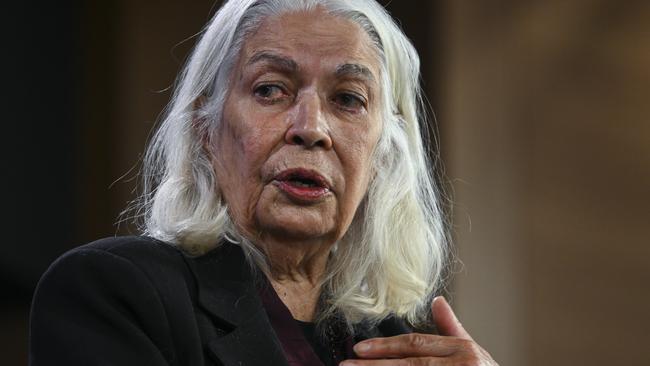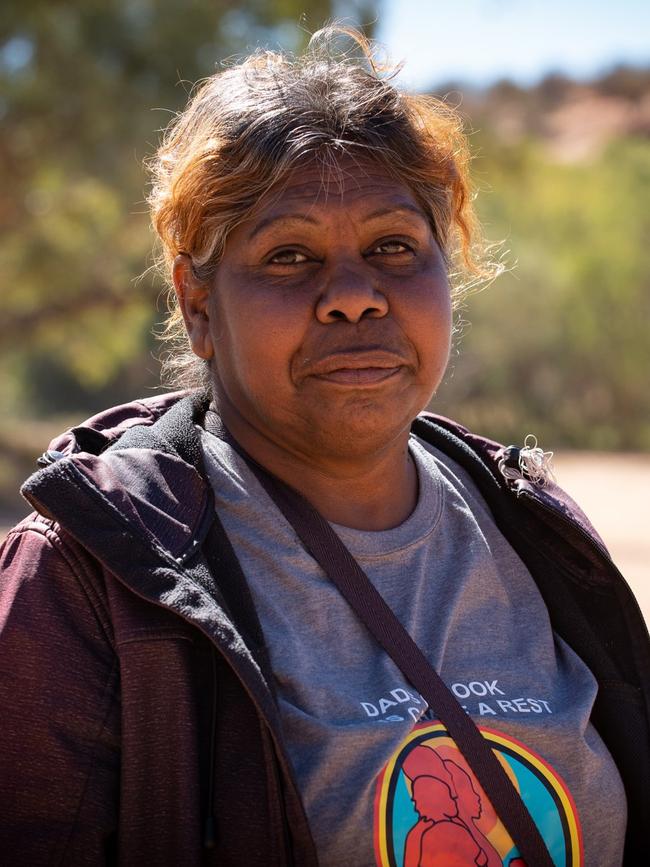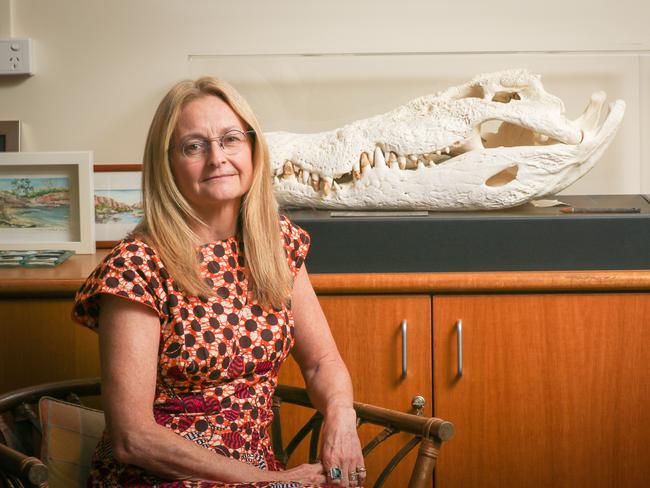Alcohol bans ‘absolutely necessary’ across the Territory, domestic violence inquest hears
Indigenous academic powerhouse Marcia Langton has labelled the NT’s alcohol laws ‘absurd’ and ‘nonsense’, calling for tighter restrictions in Darwin and Alice Springs.

Northern Territory
Don't miss out on the headlines from Northern Territory. Followed categories will be added to My News.
Eminent Aboriginal academic Marcia Langton has told the Coroner extending alcohol bans across the Northern Territory is an “absolutely necessary public health measure”.
Professor Langton said tightening “exceedingly lax” alcohol policy was central to tackling domestic violence and reducing anti-social behaviour more generally.
“Herein lies the secret to the whole puzzle – you have to have alcohol restrictions in place at all times, no exceptions,” she said.
“The restrictions need to be uniform across the jurisdiction, not severe in Aboriginal areas and open season in the towns.”
Professor Langton was called to give evidence on Tuesday at an inquest examining the domestic violence crisis in the Territory through the deaths of four Aboriginal women killed by their partners: Kumarn Rubuntja, Kumanjayi Haywood, Miss Yunupingu and Ngeygo Ragurrk.


The inquest – which began in Alice Springs in June and reconvened in Darwin this week – is now in its final two weeks of evidence.
Coroner Elisabeth Armitage is set to hear from experts and service providers reflecting on failings, gaps and needs in the NT’s domestic violence response, which will help inform her eventual recommendations.
Evidence to date has revealed repeated themes in the four horrific deaths – of red flags missed, under-resourced services, under-trained responders, and a system that failed to save them.
In each case, the man was drunk when he killed his partner.
Professor Langton emphasised that while alcohol was not the root cause of domestic violence, it can be a trigger that exacerbates both the risk and severity of assaults.
She said current takeaway alcohol restrictions in places like Alice Springs, which still allow individuals to buy a bottle of spirits or slab of beers each day, were “absurd”.
“The restrictions are aimed at the amount of alcohol that might be used at a buck’s party,” she said.
“Governments need to have a close look at these restrictions and bring them into line with medical advice.”
Professor Langton rejected arguments it was discriminatory to allow some groups to drink and not others.
“Some politicians will say ‘Oh, but we have to consider the tourism industry, how will the tourists be able to have a drink in the evening?’ or ‘How about the bloke who’s worked hard all day, isn’t he entitled to have a beer on his back veranda in the afternoon?’ This is all nonsense,” she said.
Professor Langton said there were always options to allow people to drink “ without making the alcohol available to all and sundry”, pointing to measures such as the Gove Peninsula’s individual liquor permits.
“It is not racially discriminatory to have an alcohol management plan … aimed at protecting vulnerable women and children and old people from violence.”
Professor Langton described the $20m committed to reducing domestic violence in the NT’s last budget as “gobsmacking”, telling the court the $180m requested by stakeholders would be “an absolute minimum”.
“I doubt that business plan involves dealing with the alcohol restrictions, and if it doesn’t, well, you can add another $200m there,” she said.
“If you have domestic violence, then you have violence in general – you have gang violence, you have youth violence.
“If you want to reduce anti-social behaviour in the Northern Territory, then you have to start with reducing the domestic violence.
“We need to make it very clear to the entire population that violence will not be tolerated.”
Oct 30: Massive economic cost of DV highlights funding shortfall
The cost of domestic and family violence against women in the Territory could be costing more than $600m annually, a court has heard.
A landmark coronial inquest into domestic violence against Indigenous women in the Territory reconvened in Darwin on Monday.
Giving expert evidence was Penny Drysdale, a government policy adviser and former manager at Alice Springs’ Akeyulerre Healing Centre.

She said she was “not surprised” at the massive economic cost, telling the court it was likely much higher.
The figures, based on KPMG modelling, suggested between $457.2m and $606.1m in 2020-2021 dollars was lost each year as a result of domestic violence, representing 1.75 to 2.32 per cent of the Territory’s GDP.
“I think even that $600 million figure is probably very conservative, given that only particularly specific things were taken into account in the national research that was extrapolated for the territory context,” Ms Drysdale said.
An expert panel of NT domestic violence services called for $180m over five years to fund the Domestic, Family and Sexual Violence Framework Action Plan, however just $20m over two years was committed in the Territory’s latest budget.
Throughout the inquest expert witnesses have flagged how chronic underfunding undermines crucial services in the prevention and response to domestic violence.

Ms Drysdale said along with more money, the five year commitment was important to allow programs to develop.
“Two years is not a sufficient length of time to stand up new programs, recruit, attract and induct skilled staff, give programs an opportunity to start doing some good and properly evaluate the merits of the program,” she said in her statement, tendered to court.
“It’s widely accepted that for meaningful change to occur at an individual level, an organisational level, and a community level it takes time.”
She said a lack of specialised domestic violence workers in the NT means “it can take even longer than usual to get a program up and running in Northern Territory”.
Ms Drysdale said additional funding could help address key needs including more men’s behaviour change programs, response models that provide an alternative to incarceration, and an expansion of specialist domestic violence courts.
The inquest continues this week.
More Coverage
Originally published as Alcohol bans ‘absolutely necessary’ across the Territory, domestic violence inquest hears





